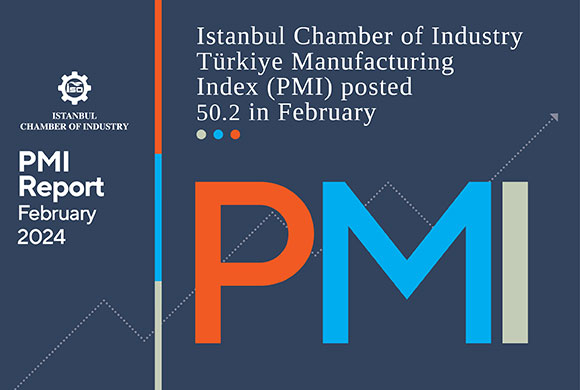News
ICI Released February 2024 ICI Türkiye Manufacturing PMI and Türkiye Sector PMI Report
- 01.03.2024
- News

The headline PMI posted 50.2 in February up from 49.2 in January. The reading therefore signalled a first improvement in business conditions for eight months. While purchasing activity increased, firms experienced a moderation of employment and stocks of input amid difficulties sourcing new staff and supplying raw materials. In terms of prices, the pace of inflation ticked lower; but this was not the case with regards to output prices, however, which increased at the fastest pace since August.
According to the Türkiye Sector PMI of Istanbul Chamber of Industry, 4 out of 10 monitored sectors increased their output in February. Output in new orders was limited to food products only, while the sharpest increase in cost inflation was seen in land and sea vehicles sector. Half of the sectors increased their staffing levels in February. The strongest increases in employment were observed in chemical, plastic and rubber products sector.
The February 2024 period of Istanbul Chamber of Industry (ISO) Turkey Manufacturing PMI (Purchasing Managers’ Index) survey, which is the fastest and reliable reference accepted in manufacturing industry performance of the economic growth was announced. According to the results of the survey where any figure greater than 50.0 indicates overall improvement of the sector, the headline PMI moved back above the 50.0 no-change mark in February, posting 50.2 from 49.2 in January. The reading therefore signalled a first improvement in business conditions for eight months, albeit one that was only fractional.
Central to the strengthening of overall operating conditions in February was a renewed expansion of manufacturing output. Production increased for the first time since June last year, and at a solid pace. Where production increased, panellists reported signs of customer demand improving. Although new orders continued to moderate, the latest slowdown was only marginal and the least marked in the current eight-month sequence of easing new work. Similarly, new export orders slowed to a lesser extent over the month.
IMPACT OF THE CHALLENGES REGARDING THE SUEZ CANAL
Tentative signs of improvement in new orders and higher production requirements prompted firms to expand their purchasing activity for the first time in eight months. Stocks of inputs continued to moderate, however, in part due to delays receiving inputs from suppliers due to the challenges using the Suez Canal.
While purchasing activity increased, firms signalled a moderation of employment amid voluntary resignations and difficulties sourcing new staff. Still, manufacturers were able to continue working through backlogs of work. Input costs rose sharply again, linked to higher raw material and transportation prices, currency weakness in Turkish Lisa and the recent minimum wage increase. That said, the pace of inflation ticked lower. This was not the case with regards to output prices, however, which increased at the fastest pace in six months.
RECOVERY IN OUTPUT BOOSTS THE SECTORS
Commenting on the Istanbul Chamber of Industry Türkiye Manufacturing PMI survey data, Andrew Harker, Economics Director at S&P Global Market Intelligence, said: "A renewed expansion in output provided a boost to the Turkish manufacturing sector in February and suggests that we should see some solid growth numbers come through in the official data in the months ahead. Although new orders continued to moderate, the news here was also promising as demand neared stabilisation. Firms will be hoping that new order trends can join those for output in growth mode in the near future.”
OUTPUT INCREASES IN 4 OUT OF 10 SECTORS
The Istanbul Chamber of Industry Türkiye Sectoral PMI report for February gave tentative signs of improvement in the output of some sectors, despite the generally stable demand conditions and still high inflationary pressures. Four of the ten sectors monitored increased their output in February. This number is the highest since August last year. The sharp increase in food production was decisive in growth, while the expansion in the sector was recorded at the second highest pace in the survey history. Strong improvements were seen in the electrical and electronic products and the chemical, plastic and rubber products sectors. Growth in land and sea vehicles remained very limited. And the most significant slowdown in output was again recorded in the non-metallic mineral products sector.
HALF OF THE SECTORS INCREASES THEIR STAFFING LEVELS
On the demand side, no significant improvement was observed as in output. Total new orders fell across all sectors except for a sharp increase in food products. The sharpest decline in new orders was recorded in wood and paper products sector. A similar outlook also existed for new export orders. Half of the sectors monitored under the scope of the survey increased their staffing numbers in February. The strongest increases in employment were observed in chemical, plastic and rubber products sector. The most significant decreases in employment occurred in clothing and leather products and textiles, both at the same rate. In purchasing activities however, the prevalence of growth remained more limited with only three sectors increasing their input purchases.
Suppliers' lead times continued to remain under pressure due to disruptions in the Red Sea. The most significant extension in deadlines was experienced in the chemical, plastic and rubber products sectors, while the supplier performance improved in only three sectors. Input cost inflation remained high in February, but decreased in most sectors compared to January. The fastest increase in input prices was seen in land and sea vehicles, while the most moderate increase was recorded in non-metallic mineral products. The non-metallic mineral products sector also had the lowest finished product price inflation. And the food manufacturers' sales prices increased at the fastest pace since July last year.
You can find attached the Istanbul Chamber of Industry Türkiye Manufacturing PMI and Sector PMI February 2024 reports.